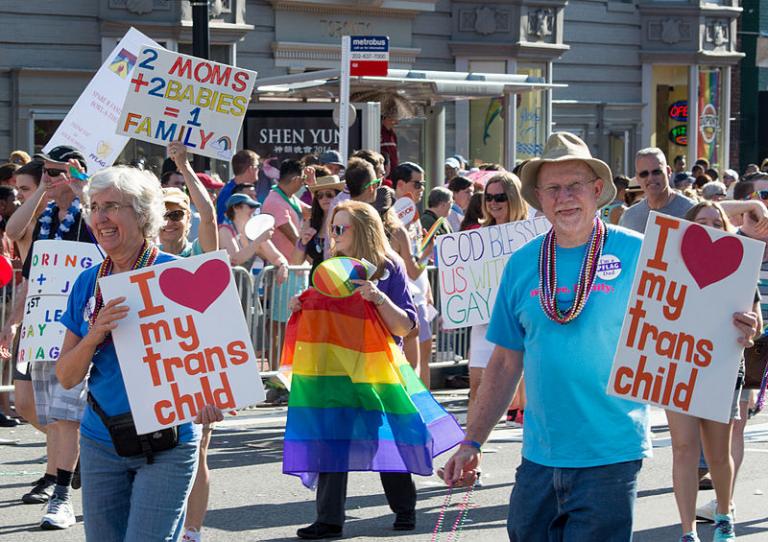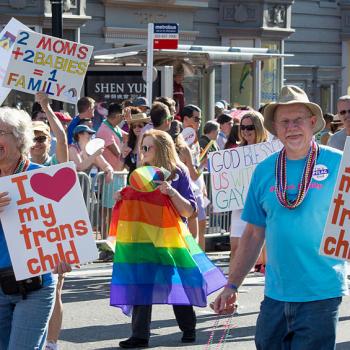
And for the last several months, one issue that I have been reading about, and retweeting articles about, is the explosion of transgender identification, especially among children, and its consequences. Now, in the past, I have had a practice of periodically scrolling through my twitter retweets to find the articles I wanted to share, as they functioned as a form of bookmarking, but too many of those articles are too far buried for me to unearth them now. Instead, a few key points for which readers will, I hope, excuse the lack of supporting links:
Children are being taught — not everywhere, but in some school districts — that whether you are a boy or a girl, or both or neither, is a matter of how you feel inside. In some cases, this is a matter of teachers undertaking this of their own initiative, either in their classrooms or through “Gender and Sexuality Alliance” clubs, which started as high school clubs to support gay & lesbian kids but moved into middle and now even elementary schools, with as the kids get younger, more teacher initiative, inviting the “misfits” or even calling it a “craft club” and keeping the whole thing secret from parents. In other cases, this is an official curriculum — Evanston/Skokie in suburban Chicago is an example of this, with a link that circulated not long ago. In other cases, this is a “model curriculum” — this was the case in New Jersey, where a state legislator posted online documents from an organization which purported to be providing a curriculum for use in New Jersey schools which conformed to their state requirements. My own state, Illinois, will require that so-called “standards based” sex ed be taught (or none at all) starting next year, and it is not yet clear how this will play out, but there are many experts who make the claim that it is an established scientific fact that, indeed, boy-ness or girl-ness, or both/neither, have nothing to do with your body, but just your self-perception. (The NJ model curriculum went all-in here, promoting the labels Reproductive System One and Reproductive System Two instead of Male and Female, and emphasizing such terminology as “person with a penis” instead of “boy,” even for very young children.) And there are anecdotal reports that those young children become quite confused with this instruction, taking it literally to mean that if they don’t have a strong sense of “I am a girl/boy” — or if they don’t conform to gender stereotypes — then that means they aren’t one.
(Side note: a couple years ago, there was a spate of reports about parents declaring they were raising their children wholly-gender neutral, not merely by means of offering them both stereotypical boy and girl toys and activities, but using the pronoun “they,” not telling those around them what sex the child was and, it appeared, not even explaining to the child that to have a penis meant being a boy, and to have labia meant being a girl, but instead saying, “our child will tell us, one day, whether they are a boy or a girl.” And, sure enough, there was a follow-up report that one such child did declare himself to be a boy — but it was not remotely clear from the reporting whether that child had said, “enough of this nonsense, I understand that children with penises are boys,” or whether the child was instructed to choose a sex based on feeling more comfortable playing with boys and with boy toys and wearing boy clothes, or the reverse.)
Not long ago, there was a further report promoted by the American Academy of Pediatrics which determined that nearly all children who were deemed to be transgender at a young age and socially transitioned, ended up eventually being given puberty blockers and cross-sex hormones. This was deemed by the study authors and those who promoted it to be proof that those children “really are” transgender, and therefore that social and eventual hormonal/surgical transition is the right path — when it might entirely appropriately be interpreted wholly differently, as proof that social transition (the affirmation of an opposite sex identity, with pronouns, name, bathroom use, etc.) is a path of no return, not “reversible” as proponents claim, and that alternate measures, such as permission for gender nonconformist toys, dress, etc., are preferable — especially since the former path is a path towards life-long medicalization, with consequences that are not being acknowledged by its promoters, who insist that a trans kid without affirmation is doomed to suicide (based on faulty studies, or rather, I believe, a faulty study, singular, from The Trevor Project, both because they/it survey(s) self-selected groups who are prompted to indicate the desired response, and because they ignore co-morbidities, that is, other unaddressed mental health needs which may be triggering both the suicidality and the discomfort being interpreted as transgenderness), and that any long-term health issues can be remedied by future scientific advancements, such as improved methods of plastic surgery, future fertility medicine solutions, etc.
Yeah, that’s a long sentence. Sorry.
And teenagers? Hoo-boy. The reports of teen girls, with teenage angst about their bodies, who have a perfectly natural dislike of menstruation (in addition to being a nuisance, it is particularly unpredictable in the early years, and can result in embarrassment, especially for a girl who bleeds-through and has stained clothes, and results in cramps which can be difficult to manage), going down a rabbit hole of tumblr and tiktok and God-knows-what-else to find affirmation that if you feel this way, there’s an answer, and that’s that you’re trans, or nonbinary, and surreptitiously beginning hormone administration (or doing so — well, they worry me greatly, especially since I see it in action, indirectly, anyway, through the reports from my children and through theater programs which bios of the student actors in which, predictably, some number are using the “they” pronoun and some of the male parts are taken by students who are clearly girls. Oh, and that’s not to mention the boys who deem themselves trans because they don’t conform to “boy” stereotypes. (One such kid had a distinctive enough adopted name that I googled him after he went off to college, and he had a youtube page with a self-written song the content of which was basically proclaiming serious mental illness/depression.)
At the same time, so far as I understand, among those adults who identified as transgender in adulthood, there are some who genuinely consider themselves to truly *be* the sex they identify as. Thus we have the saga of the “pregnant man,” and all the new terminology such as “chestfeeding,” “pregnant person,” and people who insist that because a transwoman who hasn’t had surgery has a penis, there is nothing about a penis which identifies it as a “male” body part. At the same time, there are others who, quite sensibly it seems to me, say, “look, I know I am a man even though I have a transgender identity; I dress and strive to appear as a woman because it improves my well-being and life satisfaction, but I’m not a fool.” It’s my understanding that for these latter individuals, the degree of hormonal or surgical intervention they undergo varies based on their own preferences.
Which gets me to the question: how should I (and you, dear reader) respond? And that means both in terms of politics, state and local, as well as in our daily lives.
Locally, each school district in Illinois will now be making decisions on how “gender identity” is taught in the classroom. From what I can tell from community Facebook groups I’m a part of, this is not something that’s on anyone’s radar, and it seems to be treated as offensive to suggest that there are reasons for concern. To what extent do people in the community truly believe that “to be a boy or girl or both or neither” is an innate matter of identity that is not related to one’s chromosomal makeup or body parts, and wish to affirm kids who identify in non-traditional ways? Do they simply believe that reports of even neighboring school districts formally teaching this doctrine, are all overblown and of no concern because no child would ever be negatively affected by this instruction, and, likewise, that reports of teenagers suddenly identifying as trans are so small in number as to be a nonconcern? Or are people afraid of sounding like “right-wingers” for voicing concern, and figure it’s a cause for someone else to take up as long as they feel confident their own kids are “safe”?
But there are other issues besides political activism, namely, when the issue comes home. A classmate of my son’s claimed to be nonbinary at the beginning of the year; now she has adopted a male name. Ignoring issues of locker rooms or sports teams (which is, of course, not an issue for girls asserting new identities, with the exception of cases in which they begin the administration of testosterone), how is a child, and how is an adult, to respond, both in the case of children and adults?
After all, the emerging demand is that it is obligatory to use that individual’s chosen pronouns — whether those of the opposite sex, the “they/them” construction, or even neo-pronouns such as the sort that the twitter account Libs of TikTok highlights (yes, including “tree” gender, “cake” gender, “cat” gender, and so on). There are even reports of children being disciplined for failing to do so, with respect to classmates — and, indeed (yes, I now have a link), as a Federalist author wrote today, “Fairfax, Virginia Schools May Expel Elementary Students For ‘Misgendering’ People.” Citing a school district document up for approval by the school board, the author reports,
Fairfax’s proposed changes, set to be approved May 26, have hit a new low. Legally meaningless offenses such as “malicious misgendering” and “outing related to gender identification” would be now punishable by up to “Level 4” sanctions. It’s the last level before penalties for drug dealing, rape, and homicide.
Level 4 is the punishment meted out for assault and battery, drug consumption, theft, and arson. These penalties may be applied even to kindergarteners and include, at their worst, expulsion at the behest of the school board.
Now, it should be obvious that legally compelling a student, or a teacher, or anyone at all, to use some selected pronouns is a matter of freedom of speech and of conscience, and, in fact, US courts have agreed, though it’s a different story elsewhere in the Anglosphere.
But setting the question of mandates and talking about choices: where does the obligation to be polite, or to engage in a sort of Christian compassion end, and the obligation to be honest and truthful and avoid what is “nice” but harmful, begin?
I take it as a given that the notion that “gender” is a matter of “how you feel” is simply wrong. Ther is no evidence demonstrating this and the claims that “transness is real” supporters make become increasingly preposterous the more one reads, taking the reality of intersex people, an extremely tiny portion of the population, particularly when it’s a matter of “true” intersex-ness rather than superficially abnormal appearances, as well as the wide degree of human variation (unlike other species, not all adult males are physically dominant over adult females) and deeming this to be proof that “male” and “female” are not real categories — while at the same time, of course, demanding that private sector employers and the federal government be obliged to fund surgeries intended to make a person look more “feminine” or “masculine” as desired (but only if that targeted appearance is of the opposite sex! Women with undesirable body hair or a flat chest don’t get financial help in a quest to look more feminine).
But at the same time — yes, I am repeating myself — I don’t really have a bit objection to a fully-mature adult making the decision that, for whatever reason, it improves their well-being to present as the opposite sex, so long as it doesn’t affect others, that is, so long as those would-be women don’t demand access to female changing rooms (that is, spaces where women and girls are naked with an expectation of privacy and likewise expect girls to have access without seeing naked men) and female athletic events. But, again, we are speaking of adults.
And I find “non-binary” style pronouns or identification (let alone claims to be a non-human gender, or to have a gender that changes from day to day) to be actively harmful. The very descriptions used by advocates of the concept fundamentally say that to be female is to conform to stereotypes of female preferences and behaviors; and similarly for being male, and I cannot understand how they themselves don’t see how wrong this is. After all, I am a mother of boys who had no interest in athletics. I am a woman who has never had an interest in appearance, beauty products, or fashion, nor had any skill in putting an outfit together. But being male or female does not govern one’s interests or preferences, and to be male or female is not, in fact, at the core of one’s identity but simply one part of it.
As to the pronouns, well, that the English language uses a different pronoun for men and woman is simply a part of English grammar. The fact that German has three genders and each noun has an associated gender does not imply anything about that object: Tisch, or table, is masculine; Stuhl, or chair, is masculine; but Bank, or bench, is feminine; and Bett, or bed, is neuter. This does not mean that a table is manly and a bench is womanly. Heck, just as English has two words for that living room piece of furniture, couch and sofa, German does, too: die Couch and das Sofa. For that matter, the word for girl is das Madchen, that is, it is neuter in gender — and, indeed, it’s my understanding that, for this reason, Germans inconsistently use the pronouns which translate as “she” or “it” when referring to a girl. They are, after all, just words. And, yes, the Chinese language has no differentiation between “he” and “she” but that doesn’t mean they don’t know the difference between men and women; it’s just a matter of grammar. When I use the masculine pronoun for a man or the feminine pronoun for a woman, I am not making a statement about their self-perception, because that’s not what grammar is for.
When an individual makes a demand that others must use alternate pronouns, whether it’s a singular “they” (the usage of which in the past has always been confined to unknown individuals — “someone left a mess and they should pick it up” — rather than as a true *personal* pronoun) or nutty stuff like xe or tree, it becomes a demand that others must use the very conventions of English grammar to affirm their chosen identities. Twitter folks on the right will say, “my pronouns are ‘his majesty’ and ‘his royal highness,'” and it’s a joke but it’s really no different — a demand that a person who has decided to create a new identity must be constantly affirmed in that identity by those around him or her. It’s a sort of narcissism, even if the individual doesn’t recognize it, or, insofar as they make demands that they will be mentally harmed if their pronoun demands are not honored, an indicator of mental illness.
Which all adds up to the fact that, as Christians who want to do the right thing, we are not simply “being nice” or “being compassionate” in choosing to use these self-chosen pronouns, but we are actively participating to a practice which does real harm in the long term.










